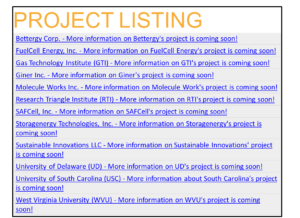REFUEL Is Back on Track
By Stephen H. Crolius on June 28, 2017
The U.S. Department of Energy’s ARPA-E REFUEL Program, whose continued existence seemed to be in doubt two months ago, now appears to be back on track. Invitations were sent a week ago for the ARPA-E REFUEL Program Kickoff, an event that was originally scheduled for April 25 and 26 in Houston. It is now scheduled to take place in Denver on August 16, 17, and 18. Attendance will be by invitation only.
ARPA-E is the DOE’s Advanced Research Projects Agency. The group’s mission is to advance “high-potential, high-impact energy technologies that are too early for private-sector investment.” REFUEL stands for “Renewable Energy to Fuels through Utilization of Energy-Dense Liquids.” According to the REFUEL Web page, the mission of the program “is to develop scalable technologies for converting electrical energy from renewable sources into energy-dense carbon-neutral liquid fuels (CNLFs) and back into electricity or hydrogen on demand,” thereby “accelerat[ing] the shift to domestically produced transportation fuels, improving American economic and energy security and reducing energy emissions.”
Last December ARPA-E announced that grants totaling $32.7 million would be awarded to 16 REFUEL proponents. Although the REFUEL program’s framing language creates a level playing field on which any “energy-dense carbon-neutral liquid fuel” can compete for funding, 13 of the 16 successful proponents are focused on ammonia. These companies will receive $27.3 million of the awarded funds. Two other proponents are focused on dimethyl ether (DME). The last one is focused on ethanol. (It should be noted that as of this date, the REFUEL Web page lists only 12 projects. The proponent of the missing project is Materials Systems Research, Inc. Their project involved development of a new ammonia-fueled solid oxide fuel cell.)
The shadow over the program appeared on April 18, just a week before the scheduled first day of the Houston meeting. On that date, Grigorii Soloveichik, ARPA-E’s REFUEL Program Director, sent an email stating that “due to unforeseen circumstances beyond our control, the REFUEL Program Kickoff meeting is postponed until further notice.” Core attendees had received a “save the date” email on February 24 and a broader group received invitations on March 17.
On April 28, Science ran a 1,700-word article that placed the REFUEL meeting cancellation in a larger context. “The Department of Energy (DOE) has stopped processing the paperwork on tens of millions of dollars in research that its Advanced Research Projects Agency-Energy (ARPA-E) has agreed to fund,” the article began. “DOE officials aren’t saying why they have taken this unusual step, dubbed a ‘no-contract action.’ It went into effect earlier this month and affects more than a dozen projects across four new ARPA-E programs. The move, first reported by Politico Pro, includes a gag order on ARPA-E program managers, leaving investigators in the dark about the status of their grants. The resulting uncertainty is having a devastating impact on research teams, scientists say, and even threatens the viability of small companies for whom these major awards are so important.”
The article stated that at least five of the REFUEL projects were “in limbo” and were “awaiting promised funding.” It goes on to say that “researchers fear this month’s action is a prelude to more drastic steps. In March, President Donald Trump unveiled a 2018 budget blueprint that proposed eliminating ARPA-E.”
Then on May 4, according to a brief Science item, the DOE “released a statement that some media have suggested ends the freeze and gag orders, actions that were never formally announced. The statement says the department ‘will honor all commitments for funds previously obligated for grants and cooperative agreements.’” Both Science stories made reference to intensifying scrutiny from both Democratic and Republican members of the U.S. Congress in the days before the first article. On May 19, Science published yet another article that detailed signs that the “no-contract action” was indeed being lifted. It made specific reference to a May 18 DOE press release stating that it would be “honoring commitments” to two of the five REFUEL awardees, and that the “additional awardees are expected to move forward in the coming weeks.”
The issuance of the updated REFUEL Kickoff invitations last week appears to be the definitive indication that the program is indeed back on track.
The REFUEL program seemed to be off to a strong start in December when the first class of grant awards was announced, with awardees coming from both sides of the ammonia synthesis-use divide. As reported in an Ammonia Energy post in December, seven projects involve technologies that aim to make ammonia from renewable electricity, air, and water. Research in this area is focused on adaptations of the Haber-Bosch process – seeking improvements in catalysts and absorbents – as well as novel electrochemical processes. As reported in a second post, five other projects involve technologies on the use side of the ammonia energy space. Three of these focus on generating hydrogen from ammonia while two focus on fuel cells that convert ammonia to electricity. The thirteenth ammonia project involves both synthesis and use of ammonia.
The December activity was followed by an announcement in January that Madhav Acharya had joined the program as a Technology-to-Market Advisor. Acharya holds a doctorate in chemical engineering from the University of Delaware in the U.S. Prior to joining ARPA-E he was employed for 18 years by Exxon Mobil. Just before leaving the company he was Manager of Research Guidance and Valuation. “In this role,” according to his ARPA-E website, “he guided new R&D assessments in ExxonMobil’s downstream portfolio, including techno-economic analysis, funding decisions and long term portfolio management.”
So far, only a high-level framework has been communicated for the agenda of the Denver Kickoff. The event will include time for individual team meetings with ARPA-E staff, a day and a half of open session presentations and discussion, and a poster session.
